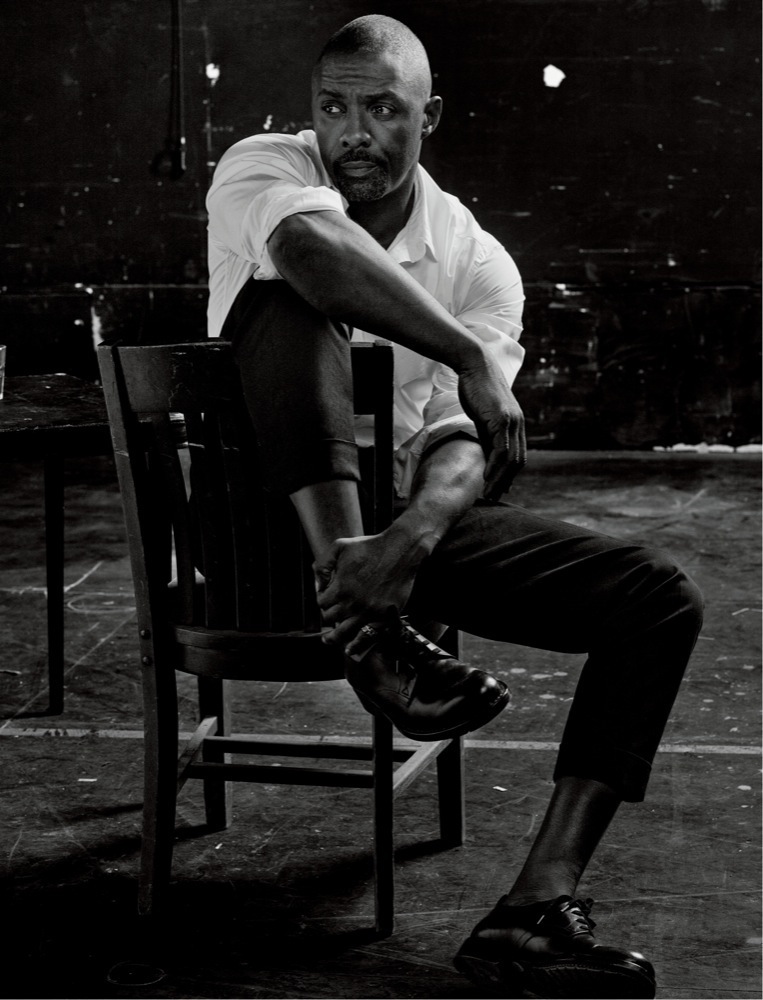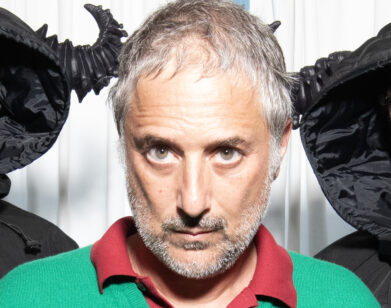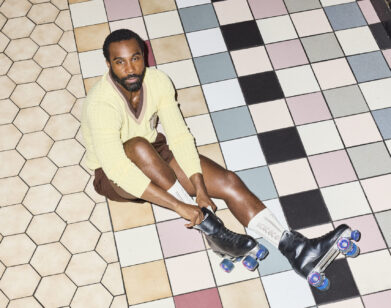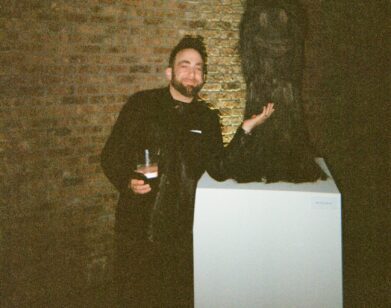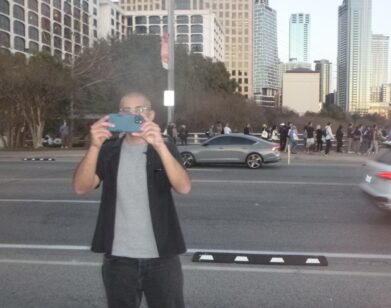Idris Elba
I DON’T EVER STOP. NOT BECAUSE I’M GREEDY OR ANYTHING, BUT I’M ALWAYS CREATING, DEBATING WITH THE PART OF MY BRAIN THAT IS DORMANT. IDRIS ELBA
Whatever its constituent parts-talent, sure; charisma, definitely—the combined quality Hollywood moguls and gossip columnists used to refer to as “it”-ness (as in, “So-and-so has it”) remains ineffable, mysterious, almost occult in its indescribableness. Whatever “it” is, Idris Elba has it in droves. Enough to fill a room, a movie, a long-running series, a planet probably.
Whether he’s on set, at a party, or at the Met Gala, which he co-hosted this past May, and even when surrounded by all the sparkliest stars in heaven, it is his gravity that draws all the eyes, his dusty baritone all the ears, and his easy, frequent laughter, more of the same. In person, the Hackney-born Elba, 43, seems taller than his 6’3″ frame, even a little hunched to get through doorways, to hear us Lilliputians.
Onscreen, Elba’s presence is greater still. Which is probably why directors so love to restrain it, to set an obstacle course for him to shine through. As the legitimate-facing member of a Baltimore gang in HBO’s The Wire, his Stringer Bell was always torn between the straight and outlaw worlds, left exposed to the slings and arrows of both, and unable to find comfort in either. Then again, as the long-suffering but brilliant detective on the BBC’s Luther, Elba seemed hardly ever able to sleep. His John Luther was haunted by the ghosts of personal tragedy and by the very real criminals tearing London to bits around him. But, by far, the worst of all lots assigned to Elba was that of the warlord commandant in Cary Fukunaga‘s Beasts of No Nation. Running a child army in a chaotic war through some unnamed African state, Elba’s unnamed character was heavy on the Colonel Kurtz scale, oversaturated by the horrors around him and within him, a force. But it was the ease with which Elba inhabited him, the natural command he filled him with, radiating at times with the kind of quirky charisma of a mystic guru or a cult leader, that made the performance something altogether new. As if that weren’t enough, Elba nearly died during production when he slipped walking behind a waterfall and only lived to tell about it because a security guard caught him.
With all this suffering around, it isn’t hard to see why fans are clamoring to have Elba finally let loose, to see him indulged, to watch him turn that charisma up to 11 and be cast as the next James Bond—fingers crossed. In the meantime, he is loading up on fantasy and CGI, playing the squid-y antagonist in Star Trek Beyond, and the gunslinger Roland Deschain in an adaptation of Stephen King’s The Dark Tower books, out next year, as well as reappearing as Heimdall in the next Thor installment. Also in the works is Aaron Sorkin‘s Molly’s Game, not to mention a bubbling DJ career, and even a fashion collection, in collaboration with Superdry. It’s a lot. But as Elba tells his pal and director of the recent The Jungle Book, Jon Favreau, he’s got a lot more where that came from.
IDRIS ELBA: Hello, Jon. What a nice surprise.
JON FAVREAU: Well, I fancy myself the modern-day Andy Warhol, so Interview magazine… How are you doing down there?
ELBA: I’m good. We’re making a very big movie, and I’m doing long hours, shooting guns and whatnot. I’m enjoying it.
FAVREAU: When I worked with Daniel Craig [Cowboys & Aliens, 2011], he said that dressing up and playing a cowboy is universal, not just an American fantasy. Is it something that was appealing to you?
ELBA: [laughs] Yeah, I mean, I used to watch Bonanza. Do you even know what that is?
FAVREAU: Yeah. I guess it took a while for our programs to get to you, because that was before my time.
ELBA: [laughs] Bonanza, man. I’ve always wanted to try the whole cowboy feel and look, so when I took this role, I was wondering, “Are we going to bring that to life in this character? Is he a real cowboy?” And the answer was no. We had to reinvent that a little bit because the world—it’s quite a fantastical world and we aren’t making a Western. But there’s definitely some characteristics from those great cowboy movies, the Sergio Leone movies and all. I was definitely drawn to it. I’ve got two smoking guns that just look incredible, and I love to pull them out whenever I can. [laughs]
FAVREAU: I remember the books, and what was cool about it was Stephen King really deconstructed the mythology. So you got all the cool gunfighter stuff, but it felt fresh and new and sci-fi, post-apocalyptic—a little bit ahead of its time actually.
ELBA: It’s exciting because it doesn’t feel like it comes from any other source. It’s not an existing group, like the Marvel films. It feels very original. The guns and fights are really essential to the story, but our director, Nikolaj [Arcel], isn’t overcooking it.
FAVREAU: You’re probably a really good judge, because you’ve worked with such wonderful people before. I was just going through the list—Ridley Scott, Ken Branagh, Guy Ritchie, Guillermo del Toro … These are guys I have a lot of respect for. What common thread do you see in all these wonderful directors that makes a director strong?
ELBA: The most important thing, which I always look for, is their 360 vision of their film. By 360, I mean every moment has been imagined once or twice, if not 50,000 times, within their heads, from performance to art direction and whatnot. It’s been a master class for me. Working with Guy on RocknRolla [2008], he was embedded in every single detail of the film. You could literally spin him around in a blindfold and stop him somewhere and say, “What about this?” and he’ll go, “Ah, that’s this.” And you’re the same, and Ridley was exactly like that. Ridley would almost sort of cut the film [Prometheus, 2012] while he was watching the takes. Sometimes he’d do a full retake, and sometimes he’d go, “I just want to do this moment here.” But I think the common denominator is that everyone really understands you. Some directors hand over portions of their movie to their head of department to the point where it’s like, “I’m not going to talk to you about the costumes, but I’m going to let you talk to the expert.” Rather than, “You want to talk stitching, let’s talk stitching. You want to talk grade of leather? Let’s.” The directors [who know every detail] make films that are complete, basically. You’re directing a movie, but you are at the head of a ship of people, a whole fleet of people. And being able to manage that—being able to handle yourself as a director being a leader—that’s massively important.
FAVREAU: And then, of course, with Luther and The Wire, you’re dealing with so many hours of entertainment that you’re not going to have that same intense collaboration with one single person. It becomes more of a collaborative sport. I know The Wire better than I know Luther, but there was a tremendous level of consistency in the storytelling in that one. I think it’s commonly agreed upon that The Wire is one of the best shows to ever air. How was that experience different? The character you played had just as much depth—probably more depth because of how much screen time there was—than the characters you played in features.
ELBA: That’s true. Television is where I cut my teeth. One of my first jobs was in a soap opera, five days a week. And what I found is, although there are different directors coming in and different crews, you just lived in your character. It’s the nature of the story, the ongoing story, and it can get deeper and deeper. And The Wire—I had moved to America a few years earlier. I had to get a job. And this character came about, and I jumped straight in. And it was like, “Today we’re doing this scene in this part of this story line in this part of this world.” You don’t have the luxury like you do in films to do one scene per day. But what kept the quality control up was that the writing was so phenomenal. The guest director could just drop into the world, those characters and their environments, and start filming, because it was sewn into us. That was our world.
FAVREAU: Like special forces. Whatever the assignment, you’re ready and you hit the beaches running.
ELBA: Exactly. And Luther is similar. There were no luxuries on Luther. It was a tough set; we worked six-day weeks in London, sometimes in the bitter cold. But the quality comes from the writing. Neil Cross has always been a great writer. But, again, we just plug and play, like you say. It’s a task force and we get on with it.
FAVREAU: When The Wire came along, you were in the States, trying to figure out where you fit in. That was probably the same period when you were DJ’ing. Is that right?
ELBA: Yep, that was how I kept the lights on, basically.
FAVREAU: I know the DJ’ing industry has changed a lot in the time since you began, because DJ’ing has emerged as one of the most lucrative, popular careers that a lot of kids are aspiring to. It’s become a full-fledged career in entertainment. And you seem to really be having a lot of fun in that world. You did some remixes for us for Jungle Book—which was great, by the way. You know, I grew up in Queens in the era when DJs were first emerging, and I was soundly impressed with what you were able to do.
ELBA: Thanks, man. I was really happy that you liked those remixes. I was nervous about you signing off on them, because I know your depth of knowledge of music. Anyway, what happened was, once I got The Wire, my life changed. I couldn’t DJ as much and I couldn’t take it seriously because my career as an actor was just getting to a place where I was finally making it in America. I wanted to be on American TV so much. I didn’t park DJ’ing; I just sort of ended up becoming more of a studio guy. I had a bit more money and I could buy every little piece of equipment and drum machine that had just come out—I’ve got quite a collection now—and I continued to collect music. Then about five years ago, my career blossomed, but I really missed being out on the road, DJ’ing. So I started picking up gigs here and there, and what occurred to me really quickly was that I was going to water down my passion for DJ’ing, because the type of gigs I was getting were celebrity DJ work, and that just didn’t sit right. So I made a decision about five years ago to really do it properly, to do it at that level I had never done it, but take it seriously and not ride the coattails of being an actor. It took a while because I had to take my time to introduce myself into that world: doing remixes, being taken seriously …
FAVREAU: And you have to stay current with it, too. So you have to listen to a lot of music and listen to a lot of other DJs. It is a community. It’s very similar, actually, to a few years ago when the professional poker player community crossed over to Hollywood. There are a lot of people who played, but you only got so far on being recognizable. At a point you cross over, and there are certain Hollywood guys who are good enough that they’re considered poker players. I don’t know if you remember Gabe Kaplan from Welcome Back, Kotter, but he was one of the guys that the poker players don’t even consider an actor anymore. He’s a full-on poker player. And there are some people who are somewhere in between, like Tobey [Maguire] … Ben Affleck is a strong player. Have you been exposed to any of that with your upcoming project, Molly’s Game, with Aaron Sorkin—yet another visionary storyteller?
I DO WORRY SOMETIMES ABOUT WHETHER I’M GOING TO BURN OUT. NOT BURN MYSELF OUT, BUT BURN MY ART OUT. IDRIS ELBAIDRIS ELBA
ELBA: It’s such an interesting world. As you’re talking about it, I’m like “Yes! I know, man!” And it’s a good comparison. But my character in Molly’s Game knows nothing about poker. Aaron has given me a lot to think about. But honestly, man, that’s blown me away, that crossover. I wonder how good a poker player would be at acting. If Ben’s a good poker player, possibly because he’s an actor, is there a poker player that’s got some real acting chops because he’s quite good at poker?
FAVREAU: I think there is. I think there are certain tricks that you learn when you’re not good. Like they say, don’t look at your cards until the bet is to you, because somebody who’s a pro is going to be able to read your face. So if you don’t know what your cards are, you don’t have to be a good actor. But the pros are very good at disguising. I find that it’s mostly about math, which is not the sexy part of the game, but they all know the math very, very well. They act like they’re being emotional, they act like they’re reading your tells, but really they’re looking for number patterns and statistics. They’re actually brilliant people. And it becomes a very interesting phenomenon, watching people who are students of human behavior. With storytellers, too, whether you’re an actor or director or—and I would even lump DJ into this category, too—it’s understanding the effect you’re having on your audience and having an interplay. There’s a calling that a certain type of people have, and they’re drawn to these occupations where they really like making other people have a good time. That feeling, that energy that bounces back at you from a group of people, that’s hard to get in other places. So I get why you go to Ibiza, I get why you still tour. I just look at your schedule and I see that it takes a tremendous amount of focus and balance to keep it going in the way that you are, where you’re raising the bar for yourself on every outing.
ELBA: But you know what, Jon? When you break it down like that, it’s unhealthy to have that much going on. [laughs] I don’t want to sound ungrateful or anything, but I sleep less, I’m constantly thinking, I’m constantly multitasking, and I really don’t know what the effects are going to be when I’m older. I don’t ever stop. Not because I’m greedy or anything, but I’m always creating, debating with the part of my brain that is dormant. Wondering how I can move in and create a bit more space and take a bit more time. But it’s almost like the more I achieve, the more capacity I have to achieve. I do worry sometimes about whether I’m going to burn out. Not burn myself out, but burn my art out, with audiences going, “Ah, yeah, I’ve seen enough now, thanks very much.”
FAVREAU: I don’t think that will happen because you create enough variety in what you do that it’s exciting to audiences. You’re challenging yourself in different ways. You’re learning. And everything that you’ve challenged yourself with to this point, from what I can tell, you’ve risen to. And you seem to be tuned into yourself well enough to know when it’s time to change the agenda. Careers go through cycles, and you seem to be really true to what your bliss is and what draws you.
ELBA: Can I ask you a question?
FAVREAU: Yeah. Please.
ELBA: I’ll tell you a story and ask you a question. So I was at a party not too long ago, and I ran into Ben Affleck. I’d had a bit to drink, and I was super excited to see him. And the reason why I’m excited to see Ben is because Ben, like yourself, is an actor who can direct. And I’ve sort of been in development to direct my first feature film. I’ve done a couple of music videos and a couple of shorts, and I’m going into that world of the feature. And I say to Ben, [slurring] “Oh Ben, hey, man. Bro, can you tell me … I just, like, I think you’re incredible.” I’m like, “I’m so interested in that transition. You’re an actor, and you’re directing, and I want to know what you had to go through and how you’re getting people …” And at the time, he was like, “Idris, just call me.” I didn’t call him ever. But I wanted to pose the same question to you if that’s okay.
FAVREAU: Well, the first thing I would say is, just on a gut level, I would buy Idris stock as a director. You carry your energy into a room in a way that would be good for a film set. I think you naturally have a certain presence that would work well with a crew. I think you’ve probably cultivated that by being an actor because, as you know, if both the energies of the lead actor and the director are good, the whole movie tends to go well. That’s intangible and hard to teach. The other thing I would say is that by working with this long list of directors … Well, my secret was that I got this wonderful paid apprenticeship, being an actor on all of these film sets. I generally wasn’t the movie star; I was number five on the call sheet. But I was still on the set, and that gave me tremendous access to everybody. And, as you said, what you like about a director like Ridley Scott or Guillermo is that he understands what every department is doing, and has a stake in every decision being made. Directing doesn’t have a built-in apprenticeship as other crafts do, which is unfortunate because you can learn so much just by watching other people. So I think that you’ve already had your film school. A trick that I used especially when I was less experienced, but still draw on sometimes, is just channeling the behavior of somebody that I respect, carrying myself in a way, imitating somebody that I’ve worked for that I like. It’ll get you through rough patches where you don’t know what to do.
ELBA: Did you watch films over and over again?
FAVREAU: I do, yeah!
ELBA: Are you watching for lighting, setups?
FAVREAU: You know, you want to collaborate with great people and you want to have them teach you as you go. That’s what pre-production’s for. And although it might seem that I know that I’m making decisions all the time, generally it’s a collaboration. Either behind-the-scenes or I will pass the ball and say to my cinematographer, “Where do you think the camera should go?” I’m a little bit different than most of the directors you work with in that I’m much more likely to say, “What do you think?” in front of everybody, because that’s just my personality type. Ultimately, I will only make a decision that I feel comfortable with, but often times, just like casting, if you get a great actor working for you, you don’t really have to push them or pull them in too many directions. The casting itself is a big creative piece of direction. Once you have the right person, the choices they make are going to fall in line with what you want, or be better than what you thought of. Same thing goes behind the camera if you pick the right people. I’d say the editor is probably the most important choice for a new director, and then cinematographer, and then, of course, casting is the most important of them all. But, like Ben said, you could pick up the phone and call him. And you could pick up the phone and call me. There’s definitely a support system among directors where we call each other, because there aren’t many people you can relate to. [laughs] There’s a lot of camaraderie in the field. I don’t find there to be too much competition. But I think you’re going to be fantastic. I would think that people would want to work with you both in front of and behind the camera.
ELBA: I’m so excited and I will be calling you. Trust me. [laughs]
FAVREAU: Great. When is Star Trek coming out?
ELBA: I go straight from this film on to the Star Trek tour. I’m really excited to promote that film. I worked with Justin Lin, who I think is a really talented director, and the crew and cast were phenomenal. I have a really complicated story line, which, God willing, comes across the way I intend it.
FAVREAU: I’m sure it’s gonna be great. I mean, the cast is great and Justin Lin is a very interesting choice. He really brought a lot to the Fast & Furious franchise, definitely put his spin on it. Which is not typically something you’ve seen associated with a franchise that’s been around so long. What is this, chapter 20? Something like that? I might be thinking of James Bond … I’m not trying to bring that up, by the way. [Elba laughs] Although I would buy a ticket. So let’s leave it at that. What a great few years you’re having here. I know you’ve got a full plate there. But, look, it was a pleasure to get to speak to you. Break a leg on the rest of the production there. I’m very excited to see Dark Tower.
ELBA: When I get to L.A., I’d love to take you to dinner, man, drinks, something.
FAVREAU: Cheers.
JON FAVREAU IS AN ACTOR AND FILMMAKER WHOSE FILMS INCLUDE ELF, IRON MAN, IRON MAN 2, AND THE JUNGLE BOOK.

